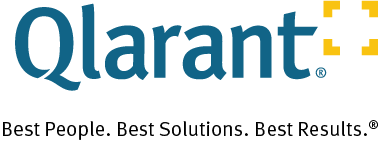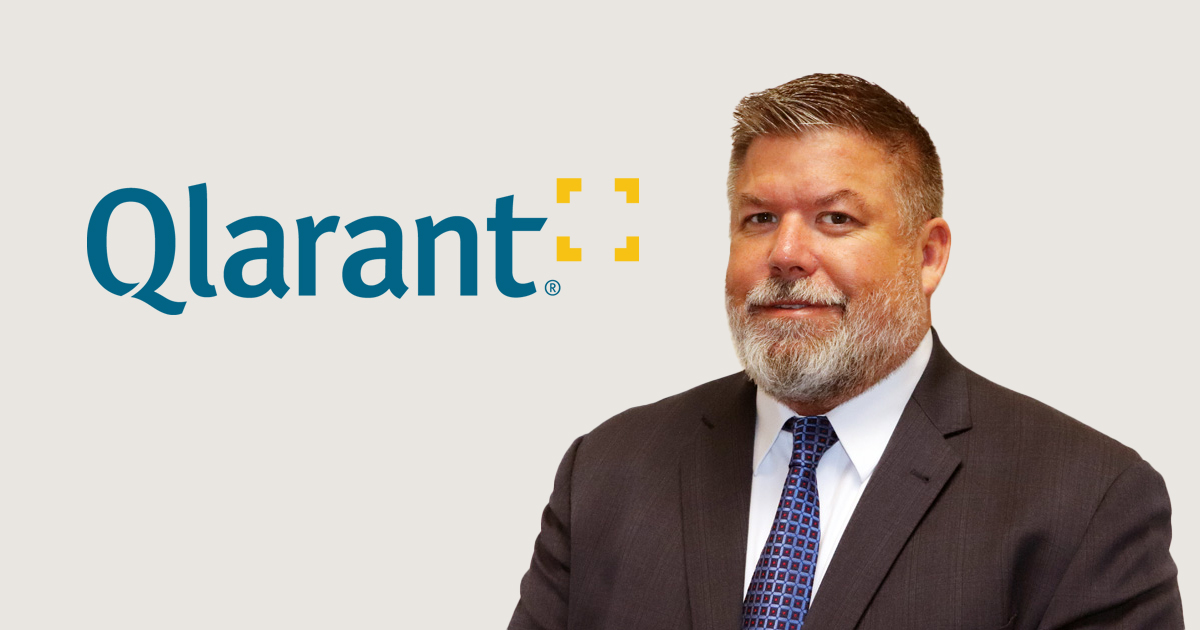Employee Spotlight: Bob Foley – Leading with a Purpose

At Qlarant, leadership is more than strategy and oversight – it’s about impact, collaboration, and a shared commitment to making a difference in the lives of real people both in the company and those we serve. Bob Foley, Chief Operating Officer for the Quality team at Qlarant, is a key leader who embodies that philosophy. He leads a team dedicated to improving the effectiveness of health care and improving the lives of the people served by Qlarant’s customers.
In this Q & A, Bob shares insights into his team’s work, their challenges and successes, and the core values that contribute to making Qlarant an impactful company.
Can you describe your role at Qlarant and how your group contributes to the company’s mission?
Bob: Each day is about listening, learning, searching for understanding, and helping to navigate challenges, while attempting to guide the organization in new and prosperous directions. I am blessed to be surrounded by amazing people who bring incredible skills, energy, and wisdom to our day-to-day operations. As COO I have the opportunity to participate in Executive Team discussions regarding the overall health and direction of Qlarant, while also having the privilege to engage in contract-level discussions with our External Quality Review, Quality Innovation Network, Intellectual and Developmental Disabilities, Aging, Analytics, and Training teams. Every day I see our Quality Team members touching lives and influencing service delivery systems. Every day our trusted colleagues are helping to improve the quality of health care and the quality of life for people living in the areas of the country in which we operate. That is what Qlarant is all about.
What are some of the biggest challenges your team tackles, and how do you work together to overcome them?
Bob: Managing customer expectations can always be challenging. As most of our work is for state and federal customers, we must adapt to ever-changing financial, political, and social landscapes. What may be important and financially feasible today, may be undesired and cost prohibitive tomorrow. Our contract leaders are masterful in developing relationships with our customers, training new state employees on the processes defined in our contracts, and perceiving and adapting to tomorrow’s priorities. The fact we have been working with many of our customers for over 20 years speaks to the effectiveness of these leaders. Shaping the behaviors of service providers, hospital and nursing home administrations, and managed care organization personnel can also be quite challenging. In many instances we are taxed with the responsibility of providing training, education, and technical assistance to entities that are locked into certain behavioral tendencies. It is only through the expertise, creativity, and persistence of our Qlarant team members that we can find unique ways to create compelling presentations for our audiences and enhance service delivery in our communities.
How does your team’s work directly impact the people or communities served by Qlarant?
Bob: Our team members work together to conduct reviews and evaluations, collect data, analyze and report on findings, make timely and relevant recommendations, and provide excellent training and education. Each time we influence the behaviors of a provider or improve upon their processes, we potentially enhance the quality of life of dozens, hundreds, or even thousands of their service recipients. Minimizing infections in a hospital setting benefits every patient entering that environment. Helping a support coordinator to enhance their understanding of person-centered concepts increases the likelihood that everyone they support will achieve the goals in life they most cherish. Influencing state and federal policy makers shapes the future for us all.
What recent project or initiative are you most proud of, and why?
Bob: I am extremely proud of our External Quality Review team and how they managed a very challenging contract over the last few years. Initially awarded nearly a decade ago, this contract received several one-year extensions, a six-month extension, and a one-month extension. The contract was rebid several times during that time but for unknown reasons was not awarded. Finally, this year, we received a five-year contract award that will take us into 2030. Operating this contract with an outdated budget and an inability to implement long-term initiatives created daily challenges. The employees working on this contract, as well as the supports provided by all of their colleagues in the EQR department and support departments throughout Qlarant, enabled us to survive the storm, develop stronger relations with the customer, and put Qlarant in a position to continue this two decade long relationship. I am continuously impressed by the patience, perseverance, and technical abilities of everyone involved in this endeavor.
How do you stay aligned with Qlarant’s values, especially around quality and collaboration in your daily work?
Bob: With a career beginning in the field of developmental disabilities, including 8.5 years as the administrator of a support coordination entity, and now almost 24 years with Qlarant, quality and collaboration have become an integral part of my professional life. Over 3 decades ago (OMG!!!) I attended a training on “Living Everyday Lives” that at the time influenced my perspective on supporting people with intellectual and developmental disabilities. Since then, the philosophies of this training have driven how I try (sometimes unsuccessfully) to perceive all life around me. Everyone is deserving of having cherished friendships, being a respected and contributing member of a community, living in a safe home, being heard, having a job and financial security, feeling healthy, and experiencing love. For some of us in this world these things are free and open. For others in this world there are barriers every step of the way. By demanding high quality supports and services we can begin to remove those barriers. Only by working in collaboration with like-minded people and with those who see the world differently, can we create a society where people experience these opportunities regardless of the challenges life has dealt them or the path they choose to follow.
What partnerships or collaborations have been key to your group’s success?
Bob: There are so many partnerships and collaborations one could look to, such as with Qlarant operational entities, prime contractors, subcontractors, customers, providers, and community members when identifying contributors and relationships that have been key to our successes. When in doubt however, I suggest we look within. Qlarant’s support departments are amazing. When everything is going smoothly, they are almost taken for granted. The reality is they form the solid infrastructure upon which our contracts are built. Many times, I have said I am appreciative of Qlarant’s Finance, Human Resources, and Contracts departments for keeping me in line. IT, Facilities, Business Development, Marketing, Quality Management, Training and Education, and the Mail Room staff have all played a key role in our success. The breadth of knowledge of our colleagues in all our support departments is amazing. Without these partnerships and collaborations, we never would have become a $100 million organization.
Can you share a moment or experience that really affirmed the importance of the work you and your team do?
Bob: A number of years ago, one of the components of our contract with the Georgia Department of Behavioral Health and Developmental Disabilities was to facilitate state and local Quality Councils. Our incredible Quality analysts would pull together and present data in a way that could be easily digested by people receiving services, family members, state officials, providers, advocacy group members, and other community members, and tell stories regarding the condition of the service delivery system at the state and local levels. The local Quality Councils used the information to identify the root causes for some of the issues they might be experiencing in service delivery and develop plans to address any existing gaps. One group looked at data suggesting the type of training typically being provided for people with intellectual and developmental disabilities on the topic of “Abuse, Neglect, and Exploitation” was not effective. In response, they developed an educational video and recruited self-advocates to provide training to their peers on how to recognize and speak up against abuse, neglect, or exploitation experienced from service providers or anyone else in the community. Ultimately the state used this format to expand the training statewide. Though the training, like the Quality Councils, was eventually discontinued, this situation demonstrated how Qlarant could inspire meaningful actions to educate and protect people who are often vulnerable.
What do you see as the biggest opportunities for growth or change within your group in the next year?
Bob: As Qlarant marches on towards our corporate growth goal, we are committed to finding new opportunities for growth and expanding our existing contracts. We are continuing our outreach at conferences and with state/federal entities to inform potential customers of our skills and to find additional business in existing and new markets. We must all be prepared to inspire, recognize, and respond to opportunities that could expand our Qlarant footprint and drive growth and diversity in our product lines. One never knows what future contract could spawn the next Qlarant transformation.
How do you support professional development and morale within your team?
Bob: I have been blessed to be surrounded by professional, motivated, intelligent, energetic, and ethical colleagues for the past 24 years. As does any coach, I try to create an environment where people have opportunities to contribute and be successful. Where possible we have been able to provide opportunities for advancement within the organization for many employees, though I need to do a better job of creating new business opportunities to reward the folks who are willing and extremely able to take on greater responsibilities. I believe Qlarant’s culture promotes morale, and I know corporately we try very hard to support people to be successful and to feel they are part of something meaningful. At the end of the day, I guess I have also learned to just stay out of the way and embrace the talents each one of our employees brings to the table.
What advice would you give to someone looking to work for your team at Qlarant?
Bob: Our coaches, with the help of Human Resources, are great at finding and hiring talented individuals, who care. When I look across the board at the team members within the division, I see people who bring specific skills needed in their positions, who support their colleagues to be successful, who are highly motivated, who are flexible, who enjoy being a part of something bigger than themselves, who have passion for what we do, and as I suggested above, who care about the outcome of our efforts. My advice is to develop the skills you need via training or experience to make the contributions needed in your desired position, and to care as much about the person next to you as you do for yourself.






